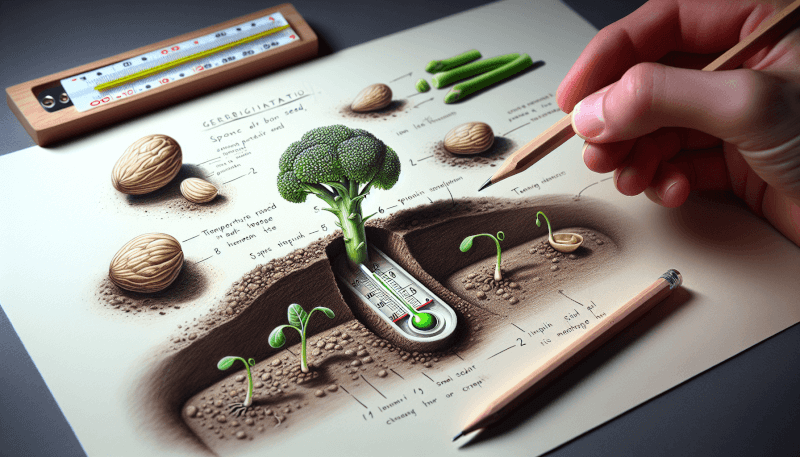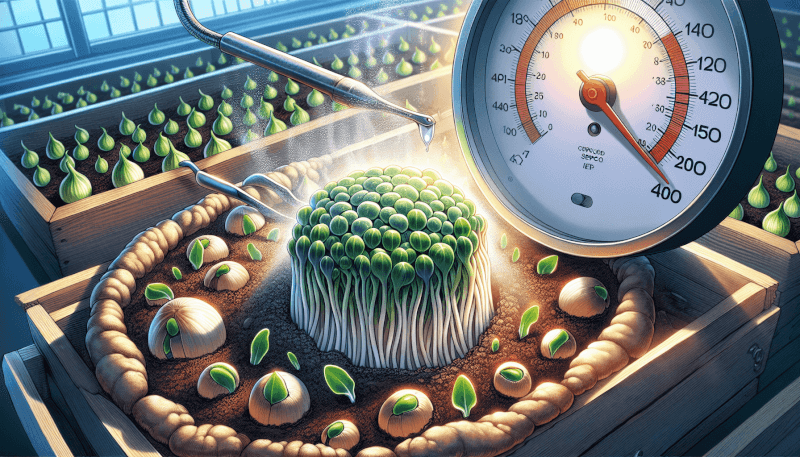Have you ever wondered at what temperature broccoli seeds start to sprout? Understanding the ideal germination temperature is essential for successful broccoli cultivation. In this article, we will explore the specific temperature range in which broccoli seeds are most likely to germinate, providing you with valuable insights on how to optimize your growing conditions and ensure a bountiful harvest. Whether you are a seasoned gardener or a novice, this information will help you kickstart your broccoli seeds with confidence and set them on their journey towards becoming thriving, nutritious plants.
Factors Affecting Broccoli Seed Germination
When it comes to growing broccoli from seeds, several factors can significantly influence the germination process. Understanding these factors is essential for successful broccoli seed germination. The key factors that affect the germination of broccoli seeds include temperature, moisture, light, soil conditions, and seed quality. By paying attention to these factors, you can ensure that your broccoli seeds have the best chance of germinating and growing into healthy plants.
Temperature
Temperature plays a crucial role in broccoli seed germination. Broccoli seeds require specific temperature ranges for optimal germination. Both low and high temperatures can negatively impact the germination process, so it is essential to provide the ideal temperature conditions.
Moisture
In addition to temperature, moisture is another critical factor for broccoli seed germination. During the germination process, seeds need a consistent level of moisture to activate biochemical reactions that lead to sprouting. Proper watering and maintaining adequate moisture levels are vital for successful germination.
Light
While light is not as essential for broccoli seed germination as temperature and moisture, it still plays a role in the process. Broccoli seeds do not require light to germinate, as they can sprout in complete darkness. However, providing light after germination is important for the growth and development of seedlings.
Soil Conditions
The quality of the soil and its conditions directly impact the germination of broccoli seeds. Broccoli seeds require well-draining soil with a pH level between 6.0 and 7.0. Additionally, the soil should be loose and rich in organic matter. Ensuring these optimal soil conditions can promote healthy seed germination and vigorous plant growth.
Seed Quality
The quality of the broccoli seeds themselves also plays a significant role in the germination process. It is crucial to choose high-quality seeds from reliable sources to increase the chances of successful germination. Seeds that are old, damaged, or improperly stored may have reduced viability and lower germination rates.
Ideal Temperature Range for Broccoli Seed Germination
Understanding the ideal temperature range for broccoli seed germination is crucial for providing the optimal conditions for successful sprouting and early growth.
Germination Temperature Range
The germination temperature range refers to the temperature limits within which the broccoli seeds can successfully germinate. For broccoli seeds, the germination temperature range typically falls between 45°F (7°C) and 85°F (29°C).
Preferred Temperature
Within the germination temperature range, broccoli seeds have a preferred temperature range that is most conducive to their successful germination. For broccoli seeds, the preferred temperature range is around 70°F (21°C).

Germination Temperature Range
The germination temperature range for broccoli seeds can be further broken down into two key parameters: the minimum temperature and the maximum temperature.
Minimum Temperature
The minimum temperature refers to the lowest temperature at which broccoli seeds can still germinate. For broccoli seeds, this minimum temperature is around 45°F (7°C). Seeds exposed to temperatures below this threshold may have reduced germination rates or may not germinate at all.
Maximum Temperature
The maximum temperature, on the other hand, refers to the highest temperature at which broccoli seeds can still germinate. For broccoli seeds, this maximum temperature is around 85°F (29°C). Beyond this temperature, seed germination rates can be significantly affected, leading to lower success rates.
Preferred Temperature
While broccoli seeds can germinate within a range of temperatures, they have an optimal or preferred temperature that promotes the best germination rates and overall plant health.
Optimal Temperature
The optimal temperature for broccoli seed germination falls around 70°F (21°C). Seeds exposed to temperatures within this range are more likely to germinate quickly and have higher success rates. Maintaining a consistent optimal temperature is crucial during the germination period.
Temperature Tolerance
Broccoli seeds do have some temperature tolerance, meaning they can still germinate in slightly higher or lower temperatures outside the optimal range. However, this tolerance is limited, and extreme temperature variations can negatively affect germination rates and the development of healthy seedlings.

Effects of Temperature Extremes on Broccoli Seed Germination
Both low and high temperatures can have adverse effects on broccoli seed germination. It is important to understand these effects to better control the temperature environment for successful germination.
Low Temperature Effects
When exposed to low temperatures, broccoli seeds may experience delayed or inhibited germination. Cold temperatures can slow down biochemical processes within the seeds, leading to extended germination times or reduced germination rates. In severe cases, extremely cold temperatures can even cause seed dormancy, preventing germination altogether.
High Temperature Effects
Similarly, high temperatures can also negatively impact broccoli seed germination. Exposing seeds to excessively high temperatures can cause them to dry out or become damaged, hindering germination. In some cases, high temperatures can lead to seed dormancy or the death of the seeds, resulting in poor germination rates.
Germination Time
Germination time refers to the duration it takes for the broccoli seeds to sprout and emerge from the soil. Temperature can significantly influence the germination time of broccoli seeds.
Effect of Temperature on Germination Time
Under optimal conditions, broccoli seeds typically germinate within 5 to 10 days. Warmer temperatures can expedite the germination process, leading to quicker sprouting, while colder temperatures can slow it down. By maintaining the ideal temperature range, you can help ensure prompt and uniform germination.
Rate of Germination
The rate of germination is another aspect influenced by temperature. Higher temperatures often result in faster germination rates, while lower temperatures can prolong the process. Monitoring the rate of germination can provide valuable insights into the success of your seed germination efforts.
Methods to Control Germination Temperature
To ensure the optimal temperature conditions for broccoli seed germination, several methods can be employed. These methods allow you to control and adjust the temperature to create the most favorable environment for successful germination.
Indoor Germination
One effective method is to germinate broccoli seeds indoors. By starting the germination process indoors, you have greater control over temperature variations. You can use heating mats or adjustable thermostats to maintain the ideal temperature for your seeds.
Greenhouse Germination
Growing broccoli seeds in a greenhouse allows for precise temperature regulation. Greenhouses provide controlled environments that can maintain optimal temperatures for germination. Additionally, the greenhouse structure retains heat, creating a microclimate conducive to successful seed germination.
Cold Frame Germination
Cold frames provide a balance between indoor and outdoor germination methods. These structures utilize natural sunlight and trap heat, creating a warmer microclimate for germination. Cold frames can be especially useful in regions with fluctuating temperatures or colder climates.
Row Covers
Row covers are another method to control germination temperature. These covers act as a barrier, trapping heat and protecting the seeds from extreme temperature variations. Row covers can be made from various materials, such as plastic or fabric, and are effective at promoting stable temperatures for germination.
Precautions and Tips for Successful Germination
To maximize the chances of successful broccoli seed germination, there are a few precautions and tips you should keep in mind.
Using a Soil Thermometer
To accurately monitor and maintain the temperature for seed germination, using a soil thermometer is highly recommended. This tool allows you to measure the soil temperature accurately and adjust accordingly to meet the optimal range.
Providing Adequate Moisture
Maintaining consistent moisture levels throughout the germination process is crucial. Be sure to water the seeds adequately without over-saturating the soil. Providing a fine mist or using bottom watering methods can be effective in preventing over-watering and ensuring proper moisture for germination.
Avoiding Extreme Temperature Fluctuations
While some temperature variations can be tolerated, extreme fluctuations can be detrimental to seed germination. Try to avoid abrupt changes in temperature, especially in the early stages of germination. Sudden temperature shifts can stress the seeds and hinder successful sprouting.
Monitoring Light Exposure
Although light is not a primary factor for germination, once the seeds have sprouted, they require adequate lighting to grow into healthy seedlings. Ensure sufficient light exposure while preventing excessive heat from direct sunlight. Using grow lights or placing seedlings near windows can provide the necessary light without overheating.
Common Problems and Troubleshooting
Despite your best efforts, some common problems may still arise during broccoli seed germination. Understanding these issues and troubleshooting them promptly can help you achieve successful germination.
Slow or Uneven Germination
If you notice slow or uneven germination, it could be an indication of factors such as improper temperature, insufficient moisture, or poor seed quality. Assess the conditions and adjust accordingly, ensuring proper temperature, moisture, and using high-quality seeds for optimal results.
Damping Off
Damping off is a fungal disease that can affect seedlings and hinder their growth. It often manifests as rotting or wilting of the stem near the soil surface. To prevent damping off, ensure proper air circulation, avoid over-watering, and maintain a clean growing environment.
Overheating
Excessive heat can lead to overheating of the seeds and seedlings. This can cause them to dry out, wither, or become stunted. Keep a close eye on the temperature and provide sufficient ventilation or shading when necessary to prevent overheating.
Conclusion
Broccoli seed germination is influenced by several crucial factors, including temperature, moisture, light, soil conditions, and seed quality. By understanding and controlling these factors, you can significantly increase the success rate of your broccoli seed germination efforts. Remember to maintain the ideal temperature range, provide adequate moisture, and monitor the growing conditions closely. Following these guidelines and troubleshooting any issues that arise will set you on the path to successfully growing healthy broccoli plants from seeds. Good luck!
